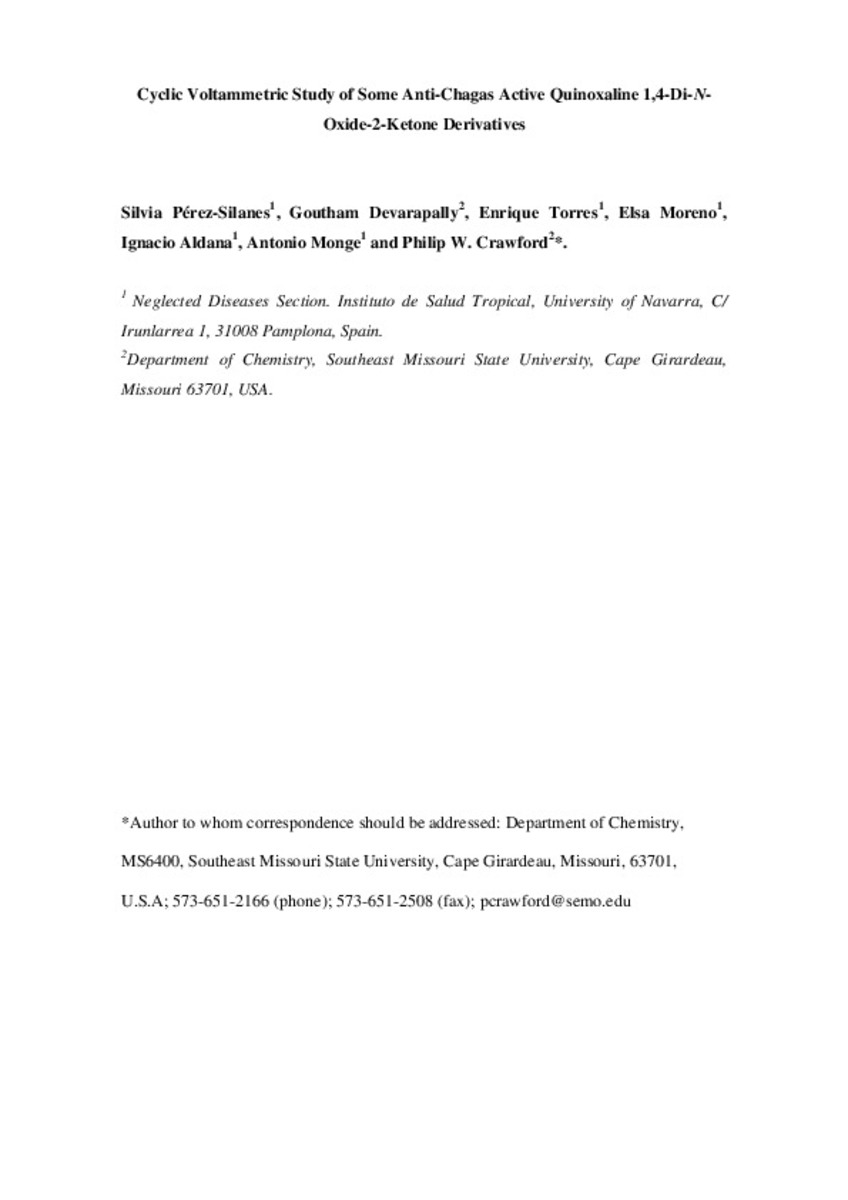Full metadata record
| DC Field | Value | Language |
|---|---|---|
| dc.creator | Crawford, P.W. (Philip W.) | - |
| dc.creator | Monge, A. (Antonio) | - |
| dc.creator | Aldana, I. (Ignacio) | - |
| dc.creator | Moreno-de-Viguri, E. (Elsa) | - |
| dc.creator | Torres, E. (Enrique) | - |
| dc.creator | Devarapally, G. (Goutham) | - |
| dc.creator | Peres-Silanes, S. (Silvia) | - |
| dc.date.accessioned | 2014-04-12T17:32:38Z | - |
| dc.date.available | 2014-04-12T17:32:38Z | - |
| dc.date.issued | 2013-02 | - |
| dc.identifier.citation | Pérez-Silanes S, Devarapally G, Torres E, Moreno-Viguri E, Aldana I, Monge A, et al. Cyclic voltammetric study of some anti-Chagas-active 1,4-dioxidoquinoxalin-2-yl ketone derivatives. Helv Chim Acta 2013 FEB;96(2):217-227 | es_ES |
| dc.identifier.issn | 0018-019X | - |
| dc.identifier.uri | https://hdl.handle.net/10171/35792 | - |
| dc.description.abstract | The electrochemical properties of 24 1,4-dioxidoquinoxalin-2-yl ketone derivatives with varying degrees of anti-Chagas activity were investigated in the aprotic solvent dimethylformamide (DMF) by cyclic voltammetry and first-derivative cyclic voltammetry. For this group of compounds, the first reduction in DMF was either reversible or quasireversible and consistent with reduction of the N-oxide functionality to form the radical anion. The second reduction process for these compounds was irreversible under the conditions used. The reduction potentials correlated well with molecular structure. Substitution in the 3-, 6-, and 7- positions of the quinoxaline ring by electron-withdrawing substituents directly affected the ease of reduction and improved the biological activities of these compounds, whereas substitution by electron-donating groups had the opposite effect. The electrochemical results, when combined with previous work on their mechanism of action against Chagas disease and their measured anti-Chagas activities, indicated that the quinoxaline 1,4-dioxide system serves as a promising starting point for chemical modifications aimed at improving the T. cruzi activity via a possible bioreduction mechanism. | es_ES |
| dc.language.iso | eng | es_ES |
| dc.publisher | Wiley | es_ES |
| dc.relation | PIUNA project from de University of Navarra FIMA (Fundacion para la Investigacion Medica Aplicada) from the University of Navarra. | - |
| dc.rights | info:eu-repo/semantics/openAccess | es_ES |
| dc.subject | Voltammetric Study | es_ES |
| dc.subject | Quinoxaline | es_ES |
| dc.subject | Quinoxaline 1,4-di-N-oxide | es_ES |
| dc.subject | Chagas | es_ES |
| dc.title | Cyclic voltammetric study of some anti-Chagas-active 1,4-dioxidoquinoxalin-2-yl ketone derivatives | es_ES |
| dc.type | info:eu-repo/semantics/article | es_ES |
| dc.identifier.doi | http://dx.doi.org/10.1002/hlca.201200085 | es_ES |
Files in This Item:
Statistics and impact
Items in Dadun are protected by copyright, with all rights reserved, unless otherwise indicated.






